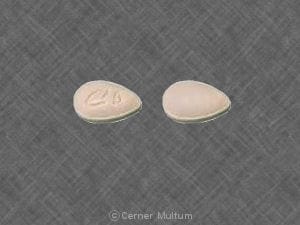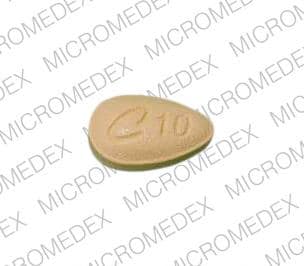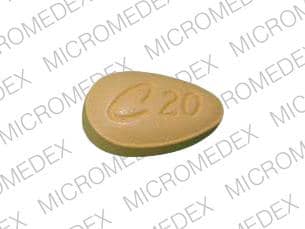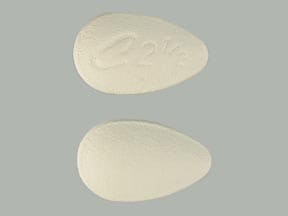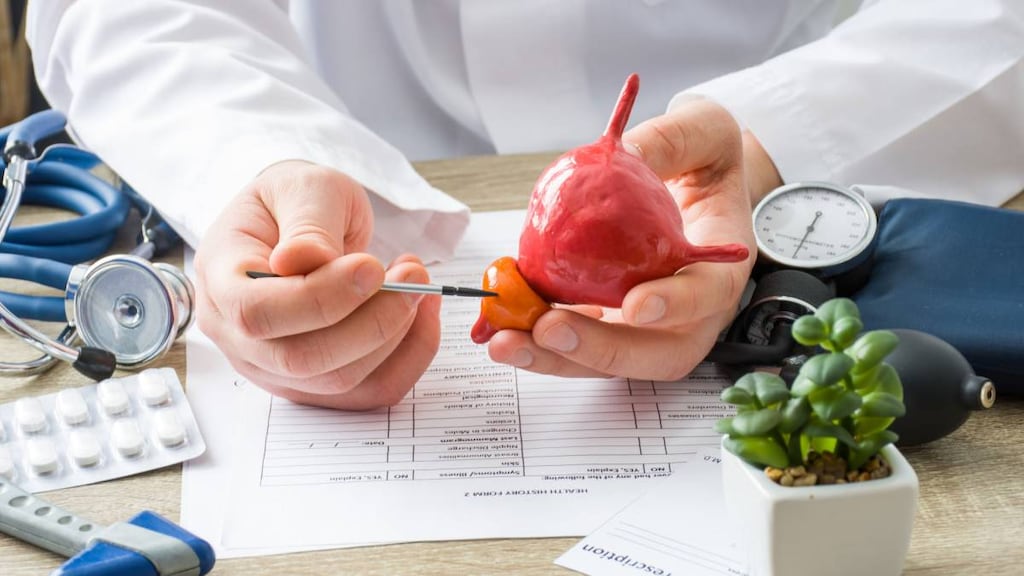What is Cialis?
Cialis is a prescription medicine taken by mouth for the treatment of:
- men with erectile dysfunction (ED)
- men with symptoms of benign prostatic hyperplasia (BPH)
- men with both ED and BPH
Cialis for the treatment of ED
ED is a condition where the penis does not fill with enough blood to harden and expand when a man is sexually excited, or when he cannot keep an erection. A man who has trouble getting or keeping an erection should see his healthcare provider for help if the condition bothers him. Cialis helps increase blood flow to the penis and may help men with ED get and keep an erection satisfactory for sexual activity. Once a man has completed sexual activity, blood flow to his penis decreases, and his erection goes away.
Some form of sexual stimulation is needed for an erection to happen with Cialis.
Cialis does not:
- cure ED
- increase a man's sexual desire
- protect a man or his partner from sexually transmitted diseases, including HIV. Speak to your healthcare provider about ways to guard against sexually transmitted diseases.
- serve as a male form of birth control
Cialis is only for men over the age of 18, including men with diabetes or who have undergone prostatectomy.
Cialis for the treatment of symptoms of BPH
BPH is a condition that happens in men, where the prostate gland enlarges which can cause urinary symptoms.
Cialis for the treatment of ED and symptoms of BPH
ED and symptoms of BPH may happen in the same person and at the same time. Men who have both ED and symptoms of BPH may take Cialis for the treatment of both conditions.
Cialis is not for women or children.
Cialis must be used only under a healthcare provider's care.
What is the most important information I should know about Cialis?
Cialis can cause your blood pressure to drop suddenly to an unsafe level if it is taken with certain other medicines. You could get dizzy, faint, or have a heart attack or stroke. Never take Cialis with any nitrate or guanylate cyclase stimulator medicines.
Do not take Cialis if you take any medicines called “nitrates.” Nitrates are commonly used to treat angina. Angina is a symptom of heart disease and can cause pain in your chest, jaw, or down your arm.
- Medicines called nitrates include nitroglycerin that is found in tablets, sprays, ointments, pastes, or patches. Nitrates can also be found in other medicines such as isosorbide dinitrate or isosorbide mononitrate. Some recreational drugs called “poppers” also contain nitrates, such as amyl nitrite and butyl nitrite.
Do not take Cialis if you take medicines called guanylate cyclase stimulators which include:
- Riociguat (Adempas) a medicine that treats pulmonary arterial hypertension and chronic- thromboembolic pulmonary hypertension.
Ask your healthcare provider or pharmacist if you are not sure if any of your medicines are nitrates or guanylate cyclase stimulators, such as riociguat. (See “Who should not take Cialis?”).
Tell all of your healthcare providers that you take Cialis. If you need emergency medical care for a heart problem, it will be important for your healthcare provider to know when you last took Cialis.
After taking a single tablet, some of the active ingredient of Cialis remains in your body for more than 2 days. The active ingredient can remain longer if you have problems with your kidneys or liver, or you are taking certain other medications (see “Can other medicines affect Cialis?”).
Stop sexual activity and get medical help right away if you get symptoms such as chest pain, dizziness, or nausea during sex. Sexual activity can put an extra strain on your heart, especially if your heart is already weak from a heart attack or heart disease. See also “What are the possible side effects of Cialis?”.
Who should not take Cialis?
Do not take Cialis if you:
- take any medicines called “nitrates”.
- use recreational drugs called “poppers” like amyl nitrite and butyl nitrite. (See “What is the most important information I should know about Cialis?).
- take any medicines called guanylate cyclase stimulators, such as riociguat.
- are allergic to Cialis or Adcirca, or any of its ingredients. See below for a complete list of ingredients in Cialis.
Symptoms of an allergic reaction may include:
- rash
- hives
- swelling of the lips, tongue, or throat
- difficulty breathing or swallowing
Call your healthcare provider or get help right away if you have any of the symptoms of an allergic reaction listed above.
What should I tell my healthcare provider before taking Cialis?
Cialis is not right for everyone. Only your healthcare provider and you can decide if Cialis is right for you. Before taking Cialis, tell your healthcare provider about all your medical problems, including if you:
- have heart problems such as angina, heart failure, irregular heartbeats, or have had a heart attack. Ask your healthcare provider if it is safe for you to have sexual activity. You should not take Cialis if your healthcare provider has told you not to have sexual activity because of your health problems.
- have pulmonary hypertension
- have low blood pressure or have high blood pressure that is not controlled
- have had a stroke
- have liver problems
- have kidney problems or require dialysis
- have retinitis pigmentosa, a rare genetic (runs in families) eye disease
- have ever had severe vision loss, including a condition called NAION
- have stomach ulcers
- have a bleeding problem have a deformed penis shape or Peyronie's disease
- have had an erection that lasted more than 4 hours
- have blood cell problems such as sickle cell anemia, multiple myeloma, or leukemia.
Can other medicines affect Cialis?
Tell your healthcare provider about all the medicines you take including prescription and nonprescription medicines, vitamins, and herbal supplements. Cialis and other medicines may affect each other. Always check with your healthcare provider before starting or stopping any medicines. Especially tell your healthcare provider if you take any of the following*:
- medicines called nitrates (see “What is the most important information I should know about Cialis?).
- medicines called guanylate cyclase stimulators, such as riociguat (Adempas), used to treat pulmonary hypertension medicines called alpha blockers. These include Hytrin (terazosin HCl), Flomax (tamsulosin HCl), Cardura (doxazosin mesylate), Minipress (prazosin HCl), Uroxatral (alfuzosin HCl), Jalyn (dutasteride and tamsulosin HCl) or Rapaflo (silodosin). Alpha-blockers are sometimes prescribed for prostate problems or high blood pressure. If Cialis is taken with certain alpha blockers, your blood pressure could suddenly drop. You could get dizzy or faint.
- other medicines to treat high blood pressure (hypertension) medicines called HIV protease inhibitors, such as ritonavir (Norvir, Kaletra)
- some types of oral antifungals such as ketoconazole (Nizoral), itraconazole (Sporanox)
- some types of antibiotics such as clarithromycin (Biaxin), telithromycin (Ketek), erythromycin (several brand names exist. Please consult your healthcare provider to determine if you are taking this medicine).
- other medicines or treatments for ED.
- Cialis is also marketed as Adcirca for the treatment of pulmonary arterial hypertension. Do not take both Cialis and Adcirca. Do not take sildenafil citrate (Revatio) with Cialis.
How should I take Cialis?
- Take Cialis exactly as your healthcare provider prescribes it. Your healthcare provider will prescribe the dose that is right for you.
- Some men can only take a low dose of Cialis or may have to take it less often, because of medical conditions or medicines they take.
- Do not change your dose or the way you take Cialis without talking to your healthcare provider. Your healthcare provider may lower or raise your dose, depending on how your body reacts to Cialis and your health condition.
- Cialis may be taken with or without meals.
- If you take too much Cialis, call your healthcare provider or emergency room right away.
How should I take Cialis for symptoms of BPH?
For symptoms of BPH, Cialis is taken once daily.
- Do not take Cialis more than one time each day.
- Take one Cialis tablet every day at about the same time of day.
- If you miss a dose, you may take it when you remember but do not take more than one dose per day.
How should I take Cialis for ED?
For ED, there are two ways to take Cialis - either for use as needed or for use once daily.
Cialis for use as needed:
- Do not take Cialis more than one time each day.
- Take one Cialis tablet before you expect to have sexual activity. You may be able to have sexual activity at 30 minutes after taking Cialis and up to 36 hours after taking it. You and your healthcare provider should consider this in deciding when you should take Cialis before sexual activity. Some form of sexual stimulation is needed for an erection to happen with Cialis
- Your healthcare provider may change your dose of Cialis depending on how you respond to the medicine, and on your health condition.
OR
Cialis for once daily use is a lower dose you take every day.
- Do not take Cialis more than one time each day.
- Take one Cialis tablet every day at about the same time of day. You may attempt sexual activity at any time between doses.
- If you miss a dose, you may take it when you remember but do not take more than one dose per day.
- Some form of sexual stimulation is needed for an erection to happen with Cialis.
- Your healthcare provider may change your dose of Cialis depending on how you respond to the medicine, and on your health condition.
How should I take Cialis for both ED and the symptoms of BPH?
For both ED and the symptoms of BPH, Cialis is taken once daily.
- Do not take Cialis more than one time each day.
- Take one Cialis tablet every day at about the same time of day. You may attempt sexual activity at any time between doses.
- If you miss a dose, you may take it when you remember but do not take more than one dose per day.
- Some form of sexual stimulation is needed for an erection to happen with Cialis.
What should I avoid while taking Cialis?
- Do not use other ED medicines or ED treatments while taking Cialis.
- Do not drink too much alcohol when taking Cialis (for example, 5 glasses of wine or 5 shots of whiskey). Drinking too much alcohol can increase your chances of getting a headache or getting dizzy, increasing your heart rate, or lowering your blood pressure.
What are the possible side effects of Cialis?
See “What is the most important information I should know about Cialis?”.
The most common side effects with Cialis are: headache, indigestion, back pain, muscle aches, flushing and stuffy or runny nose. These side effects usually go away after a few hours. Men who get back pain and muscle aches usually get it 12 to 24 hours after taking Cialis. Back pain and muscle aches usually go away within 2 days.
Call your healthcare provider if you get any side effect that bothers you or one that does not go away.
Uncommon side effects include:
- An erection that won't go away (priapism). If you get an erection that lasts more than 4 hours, get medical help right away. Priapism must be treated as soon as possible or lasting damage can happen to your penis, including the inability to have erections.
- Color vision changes, such as seeing a blue tinge (shade) to objects or having difficulty telling the difference between the colors blue and green.
- In rare instances, men taking PDE5 inhibitors (oral erectile dysfunction medicines, including Cialis) reported a sudden decrease or loss of vision in one or both eyes. It is uncertain whether PDE5 inhibitors directly cause the vision loss. If you experience sudden decrease or loss of vision, stop taking PDE5 inhibitors, including Cialis, and call a healthcare provider right away.
- Sudden loss or decrease in hearing, sometimes with ringing in the ears and dizziness, has been rarely reported in people taking PDE5 inhibitors, including Cialis. It is not possible to determine whether these events are related directly to the PDE5 inhibitors, to other diseases or medications, to other factors, or to a combination of factors. If you experience these symptoms, stop taking Cialis and contact a healthcare provider right away.
These are not all the possible side effects of Cialis. For more information, ask your healthcare provider or pharmacist.
Cialis Images
General information about the safe and effective use of Cialis
Medicines are sometimes prescribed for conditions other than those described in patient information leaflets. Do not use Cialis for a condition for which it was not prescribed. Do not give Cialis to other people, even if they have the same symptoms that you have. It may harm them.
This is a summary of the most important information about Cialis. If you would like more information, talk with your healthcare provider. You can ask your healthcare provider or pharmacist for information about Cialis that is written for health providers. For more information you can call 1-877-Cialis1 (1-877-242-5471).
How should I store Cialis?
Store Cialis at room temperature between 59° and 86°F (15° and 30°C).
Keep Cialis and all medicines out of the reach of children.
What are the ingredients in Cialis?
Active Ingredient: tadalafil
Inactive Ingredients: croscarmellose sodium, hydroxypropyl cellulose, hypromellose, iron oxide, lactose monohydrate, magnesium stearate, microcrystalline cellulose, sodium lauryl sulfate, talc, titanium dioxide, and triacetin.

